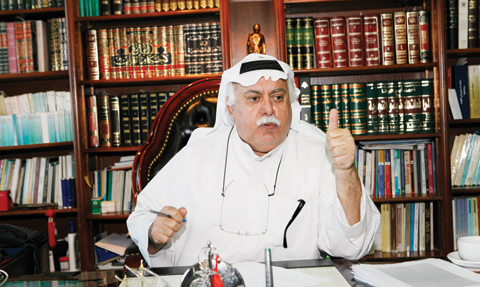Hashim confident young Kuwaitis can ‘make a difference’
 KUWAIT: Second constituency candidate Salah Al-Hashim talks to Kuwait Times. —Photos by Yasser Al-Zayyat
KUWAIT: Second constituency candidate Salah Al-Hashim talks to Kuwait Times. —Photos by Yasser Al-ZayyatKUWAIT: Parliamentary candidate Salah Al-Hashim has declared he has two main goals for contesting the upcoming National Assembly elections - to promote and apply the rights that are included in the Kuwaiti constitution, and safeguard public funds and increase them. Hashim, a lawyer, is running from the second constituency.
With his legal background, he has already prepared various legislations. "We should be monitoring the spending of public funds by the government. The present waste of funds is a result of the absence of control of the parliament. If I win, I will suggest banning spending any amount without the approval of the parliament," Hashim told Kuwait Times.
Legislative proposals
"I will demand forming a temporary committee at the parliament to review all laws that were issued during the past 10 years and see if they conform to the constitution, especially these related to freedoms," he said. "I will also submit a proposal that all legislations should be subjected to the courts. This includes the Kuwaiti citizenship law, which shouldn't be separate from the judiciary. Also, administrative deportations should be reviewed by the courts, and the same thing applies to places of worship," he said.
"The legislative power should be supervising these issues, as the three powers should be separated. There should be no excuses such as 'state sovereignty' on these issues. According to article 50 of the constitution, the three powers should be separate but cooperative," stressed Hashim.
Art revival
Hashim wants to bring back the arts, including theatre, music and sports. "We are missing these activities due to the social circumstances. The government was very weak and acquiesced to various pressures and distanced arts from our life. I call for returning drama, singing and sports competitions at schools. I also demand paying attention to historical monuments - for instance, Kuwait Museum hasn't been refurbished since 1990. I want to strengthen the cultural role of Kuwait. I want to return Kuwait to be the cultural oasis it was in the 1960s and 1970s," he explained.
"According to article 14 of the constitution, the government should protect arts and music, which is not being applied. Also, article 17 of the constitution says public funds should be protected," Hashim pointed out.
Expats
"Administrative deportation is illegal. This issue should be reviewed by the court. The expats came to Kuwait to work and help us build it, so we should respect them and not discriminate against them. The court should decide whether or not an expat should be deported, after he gets a chance to defend himself, the same way it's done all over the world," asserted Hashim.
Religious freedom
"Expats should feel free to practice their religion. At least, followers of Abrahamic faiths (Muslims, Christians and Jews) shouldn't be banned from establishing their worship places. Other religions can practice their rituals in their homes. Freedom of religion was enshrined in article 35 of the constitution for everybody living in this country," he said.
Cremation
"Some non-Muslim expats want to cremate their dead according to their traditions, but they are not allowed to do so, as cremation services are not available here. This option was available in the past, but was later stopped. The country was more tolerant in the past. This is not fair, and they should have a special place to practice this tradition," Hashim said.
Opposition
Hashim believes the opposition should be back in the new parliament. "We tried the parliament without the opposition and it was worse than before. Their absence was worse than their participation. The past parliament had bad performance. I think the turnover may be around 50 percent, as there are various parties paying to retain the previous members in the parliament," he charged.
Conclusion
"I'm optimistic that young Kuwaitis between 21 and 30 years old, who make up more than 70 percent of the population, will make a difference. Also, I believe in the strength of women voters who make up around 64 percent of the populace. I trust these two categories. I call upon women not to allow men to exploit their votes for candidates that don't work for their rights or benefit. I advise all Kuwaitis to vote and not boycott the elections," concluded Hashim.
By Nawara Fattahova










